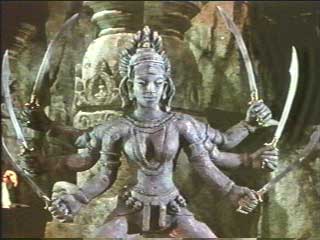What's German for 'Chickenshit Leashlickers'?
Or Arabic for 'That's Right - You're My Bitch Now'?
Fear of Offending Islam Spurs Hot Debate in Europe
from Reuters
LONDON - Four canceled performances of a Mozart opera have reignited an anxious and heated debate in Europe over free speech, self-censorship and Islam.
By canning its production of Idomeneo, fearful of security threats because of a scene that might offend Muslims, Berlin's Deutsche Oper provoked front-page headlines across the continent and found itself fending off charges of cowardice.
cowardice.
The controversy centered on a scene in which King Idomeneo is shown on stage with the severed heads of Buddha, Jesus, Mohammad and the sea god Poseidon.
"Here we go again. It's like deja vu...This is exactly the kind of self-censorship I and my newspaper have been warning against," said Flemming Rose, culture editor of Denmark's Jyllands-Posten paper, which met a storm of Muslim protest after publishing satirical cartoons of the Prophet Mohammad last year.
He said bowing to fears of a violent Muslim reaction would only worsen the problem: "You play into the hands of the radicals. You are telling them: your tactics are working. This is a victory for the radicals. It's weakening the moderate Muslims who are our allies in this battle of ideas."
B erlin security officials had warned that staging the opera Idomeneo would pose an "incalculable security risk."
erlin security officials had warned that staging the opera Idomeneo would pose an "incalculable security risk."
The decision to cancel the production even before any protests had materialized was singled out for criticism.
"To do it in advance of any actual protest I think invokes the next protest, because the radicals in any community are aided and abetted by that," said Lisa Appignanesi, a novelist and deputy president of the writers' group PEN in England. "We don't want to end up in a situation where we don't dare to speak up. What we do not want is a society where one is constantly fearful about what the people holding the bombs or the guns might say."
The latest controversy follows a furor in the Muslim world over comments by Pope Benedict this month in which he cited a medieval emperor who associated Islam with violence. He has since distanced himself from the quotations and assured Muslims of his respect, although without directly apologizing.
The opera cancellation was just the last of a series of incidents in recent years where religious sensitivities and artistic expression have clashed.
In 2004, Dutch filmmaker Theo van Gogh was murdered after outraging Muslims with a film accusing Islam of promoting violence against women, and a British play featuring sexual abuse and murder in a Sikh temple was canceled after protests.
Last year London's Tate Britain museum removed a sculpture by John Latham which it feared would offend Muslims and a British tour of Jerry Springer - The Opera was temporarily canceled when conservative Christian groups complained.
Such tensions are not new, although artists argue they have become more common since September 11, 2001. In 1989 British author Salman Rushdie was forced into hiding after Iran issued a fatwa calling for his death after he wrote The Satanic Verses.
"You can't be afraid of constantly watching your back in the arts," PEN's Appignanesi said. "One is in the business of provoking response. Otherwise there is no art."
from Reuters
LONDON - Four canceled performances of a Mozart opera have reignited an anxious and heated debate in Europe over free speech, self-censorship and Islam.
By canning its production of Idomeneo, fearful of security threats because of a scene that might offend Muslims, Berlin's Deutsche Oper provoked front-page headlines across the continent and found itself fending off charges of
 cowardice.
cowardice.The controversy centered on a scene in which King Idomeneo is shown on stage with the severed heads of Buddha, Jesus, Mohammad and the sea god Poseidon.
"Here we go again. It's like deja vu...This is exactly the kind of self-censorship I and my newspaper have been warning against," said Flemming Rose, culture editor of Denmark's Jyllands-Posten paper, which met a storm of Muslim protest after publishing satirical cartoons of the Prophet Mohammad last year.
He said bowing to fears of a violent Muslim reaction would only worsen the problem: "You play into the hands of the radicals. You are telling them: your tactics are working. This is a victory for the radicals. It's weakening the moderate Muslims who are our allies in this battle of ideas."
B
 erlin security officials had warned that staging the opera Idomeneo would pose an "incalculable security risk."
erlin security officials had warned that staging the opera Idomeneo would pose an "incalculable security risk."The decision to cancel the production even before any protests had materialized was singled out for criticism.
"To do it in advance of any actual protest I think invokes the next protest, because the radicals in any community are aided and abetted by that," said Lisa Appignanesi, a novelist and deputy president of the writers' group PEN in England. "We don't want to end up in a situation where we don't dare to speak up. What we do not want is a society where one is constantly fearful about what the people holding the bombs or the guns might say."
The latest controversy follows a furor in the Muslim world over comments by Pope Benedict this month in which he cited a medieval emperor who associated Islam with violence. He has since distanced himself from the quotations and assured Muslims of his respect, although without directly apologizing.
The opera cancellation was just the last of a series of incidents in recent years where religious sensitivities and artistic expression have clashed.

In 2004, Dutch filmmaker Theo van Gogh was murdered after outraging Muslims with a film accusing Islam of promoting violence against women, and a British play featuring sexual abuse and murder in a Sikh temple was canceled after protests.
Last year London's Tate Britain museum removed a sculpture by John Latham which it feared would offend Muslims and a British tour of Jerry Springer - The Opera was temporarily canceled when conservative Christian groups complained.
Such tensions are not new, although artists argue they have become more common since September 11, 2001. In 1989 British author Salman Rushdie was forced into hiding after Iran issued a fatwa calling for his death after he wrote The Satanic Verses.
"You can't be afraid of constantly watching your back in the arts," PEN's Appignanesi said. "One is in the business of provoking response. Otherwise there is no art."




























1 Comments:
This is just absurd, less about religion and more about sheer arrogance. The Dutch are willing to accept any and all points of view, and that means even the most intolerable. If the Middle East did not have all that oil would these tantrums be allowed for even a minute? Oh, that's right, only the United States is fair game to be picked on. Everything else is to be tolerated, in the name of....something.
In his house at R'yleh dead Cthulhu lies dreaming, and he's not going to hit the snooze button again.
Post a Comment
<< Home